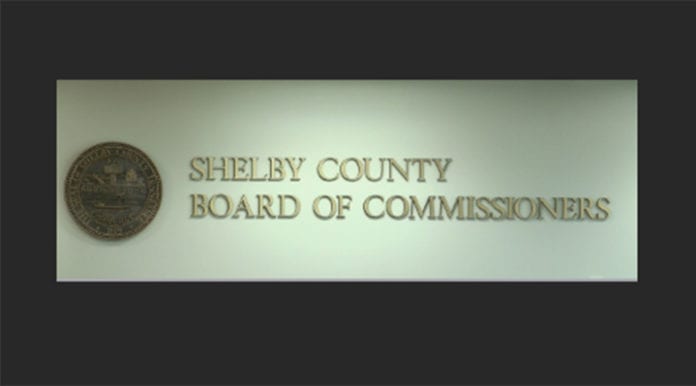With public safety and civil rights caught in a balancing act, Shelby County Commissioners Monday (Oct.2) passed a pair of data-related ordinances to keep tally of incidents involving sheriff’s deputies and motorists.
The ordinances also call for the monitoring of the use of specialized units.
However, an ordinance to ban the use of pretextual stops by deputies fell short of passage by two votes.

“My ultimate goal, which is a data-driven Shelby County, would be to streamline across all divisions, all departments, all elected offices, for us to be on one operating system of data collection and reporting,” said Commissioner Britney Thornton.
Passing 8-4, the first of the data-driven ordinances requests the Shelby County Sheriff’s Department to provide regular data collection and reporting regarding specialized units and task forces.
It also seeks statistics on participation with multi-jurisdictional and multi-agency task forces. It was sponsored by Thornton.
Voting in favor of the resolution were Commissioners Charlie Caswell, Erika Sugarmon, Edmund Ford, Jr., Michael Whaley, Shante Avant, Mickell Lowery and Chairwoman Miska Clay-Bibbs and Thornton.
It was opposed by Commissioners Brandon Morrison, Mark Bradford, Mick Wright, and Amber Mills.
Henri Brooks did not vote.
A companion ordinance requests the compilation of data related to traffic stops, arrests, use of force and citizen complaints against law enforcement officers.
In addition to Thornton, the item was co-sponsored by Whaley, Sugarmon and Caswell.
It passed 9-4.
Voting in favor were Caswell, Sugarmon, Ford, Whaley, Avant, Lowery, Clay-Bibbs, Brooks, and Thornton.
Voting against were Mills, Wright, Bradford, and Morrison.
Prior to the votes, Whaley offered a “friendly amendment” to simplify the language of the ordinances. In addition to annual funding, it also calls for a single third-party aggregator to be created to collect and store both sets of information. It passed without objection.
The ban on pretextual stops drew the support of Shelby County District Attorney General Steve Mulroy, with one caveat.
“I think, properly amended, the pretextual stop ordinance is also worthy of support, as well as the data ordinances…,” said Mulroy.
These modifications include removing a proposed ban on investigatory questioning, if the “officer is not being intimidating” or “prolonging the traffic stop.”
As written, the ordinance requests a ban of biased traffic stops and the use of pretextual stops for low-level infractions. Violations like an expired tag, broken taillight or sagging bumper are examples.
It also asks the SCSO to limit searches, questioning and the use of unmarked vehicles. It would also bar surveillance as a substitute for pretextual stops. It was also sponsored by Thornton.
Mulroy said, “I think it’s implied in the ordinance, but I think it should be made (made clear) … these things can still be made secondary violations.
“In other words, you pull somebody over for speeding or reckless driving, totally fine … That’s the way these ordinances work across the country. I just think you should make that explicit.”
He also said there shouldn’t be any data reported on investigatory questions if the stop is valid.
After failing on a 5-5-1 vote, it was clear members agreed the ordinance called for further revisions.
Voting for the ordinance were Brooks, Caswell, Clay-Bibbs, Lowery, and Thornton.
Voting against it were Bradford, Mills, Morrison, Whaley and Wright. Ford abstained.
Sugarmon was out of the room during the vote.
Before it was taken, Thornton said she anticipated the ordinance would require a fourth reading to meet the simple majority to pass.
If it eventually passes, Sheriff Floyd Bonner Jr. has expressed a willingness to comply with requests of the commission. However, the tough-on-crime candidate is currently locked in a 17-candidate race (the election is Thursday, Oct. 5) race for Memphis mayor.
Bonner, however, had concerns about data collecting.
“The difficulties in collecting the data — obviously you’ve got to have people to collect the data,” Bonner said. “We don’t know how much we’re talking about. Even if you read the resolutions, in the first one, it’s not quite clear what they’re looking for. That’s something that we’re going to have to talk with them about.”
Bonner added that the data could be presented in a public-facing dashboard that would be available online. The office, he said, publishes reports, but he thinks that a more current dashboard for the data could be possible.
Regarding the pretextual stops, the sheriff said, “I think the crime rate is too high in our city right now to start talking about pretextual stops. I mean, limiting police officers on when they can make stops, it’s just difficult now.”
The ordinances mirror ordinances passed by the Memphis City Council after the fatal bludgeoning of Tyre Nichols on Jan. 7 after he was pulled over by officers assigned to a now-disbanded special crime suppression unit.
Nichols died Jan. 10. Five former Memphis police officers are awaiting trial on state charges of second-degree murder and other serious felonies.
The officers also have been indicted by a federal grand jury for federal civil rights violations, conspiracy, and obstruction.
Unlike the council ordinances, the commission ordinances basically are recommendations since, according to state law, the sheriff is an independent elected official.
Explaining her no votes, Morrison said, “Although I appreciate the sheriff’s candor and willingness for transparency, I see it as potentially costly to the county. The sheriff is duly elected by our citizens and is required to enforce state law and that’s what he does. That’s the reason for my ‘no’ vote.”
A handful of public commenters echoed her fears. They also complained of the additional costs to the community through another government-funded program.
But Thornton countered, “I’ve heard the conversation tonight multiple times from one of the constituents that spoke about how costly it is to the county. Did you also hear the number of people who have been killed? That is very costly in settlements. I can tell you; those things are very expensive.
“Life lost is very expensive and it’s something we cannot get back.”



